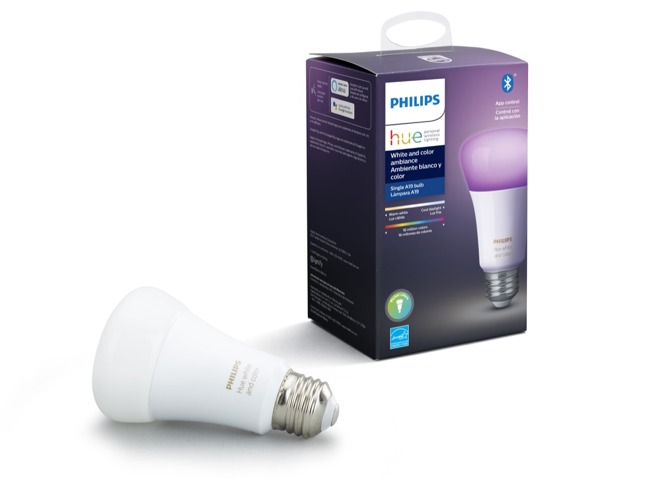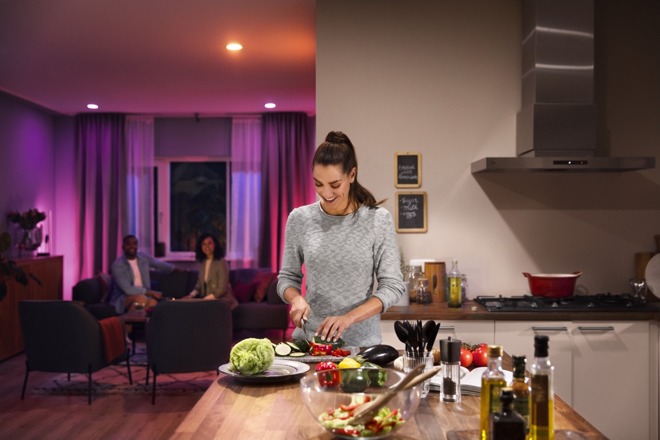New Philips Hue bulbs updated with Bluetooth connectivity
Philips has updated the Hue line with Bluetooth-equipped bulbs replacing the Zigbee-only ones, but they still need the Hue Bridge to work with HomeKit.

Hue with Bluetooth are now available in A19 and BR30 bulb types
Starting today, new A19 and BR30 Hue bulbs are available that support Bluetooth alongside the traditional Zigbee. These new Bluetooth bulbs are designed for those who are just starting out their smart home or don't have access to the internet to control their bulbs.
They are set up using the new Hue Bluetooth app, and up to 10 can be controlled through the app. A hub is not required for connectivity through Amazon Alexa or Google Assistant.
HomeKit is not supported in these bulbs over Bluetooth and still requires the Philipe Hue Bridge. At any time users can add the Philips Hue Bridge to unlock additional functionality such as support for Hue accessories and Apple HomeKit.

Hue with Bluetooth are now available in A19 and BR30 bulb types
Like the existing bulbs, white is just controllable and dimmable and stays a natural white, White Ambiance can be adjusted from a warm to cool hue of white, and White and Color Ambiance can adjust the shades of white as well as the full color spectrum spanning millions of different hues.
The new Hue with Bluetooth bulbs will replace the existing A19 traditional bulbs and BR30 downlight bulbs which are the two most common. They each come in White, White Ambiance, and White and Color Ambiance. for $14.99, $24.99, and $49.99 respectively.
Additional bulb styles will be adding Bluetooth in 2020. So far it has been a busy year for Signify and Hue. After releasing a pile of outdoor lights at CES 2019, they've launched an outdoor light strip, an outdoor motion sensor, and the indoor Aurora dimmer -- all of which AppleInsider has reviewed recently.
The new BR30 and new A19 bulbs can now be ordered on Amazon, each in White, White Ambiance, or full White and Color Ambiance versions.

Hue with Bluetooth are now available in A19 and BR30 bulb types
Starting today, new A19 and BR30 Hue bulbs are available that support Bluetooth alongside the traditional Zigbee. These new Bluetooth bulbs are designed for those who are just starting out their smart home or don't have access to the internet to control their bulbs.
They are set up using the new Hue Bluetooth app, and up to 10 can be controlled through the app. A hub is not required for connectivity through Amazon Alexa or Google Assistant.
HomeKit is not supported in these bulbs over Bluetooth and still requires the Philipe Hue Bridge. At any time users can add the Philips Hue Bridge to unlock additional functionality such as support for Hue accessories and Apple HomeKit.

Hue with Bluetooth are now available in A19 and BR30 bulb types
Like the existing bulbs, white is just controllable and dimmable and stays a natural white, White Ambiance can be adjusted from a warm to cool hue of white, and White and Color Ambiance can adjust the shades of white as well as the full color spectrum spanning millions of different hues.
The new Hue with Bluetooth bulbs will replace the existing A19 traditional bulbs and BR30 downlight bulbs which are the two most common. They each come in White, White Ambiance, and White and Color Ambiance. for $14.99, $24.99, and $49.99 respectively.
Additional bulb styles will be adding Bluetooth in 2020. So far it has been a busy year for Signify and Hue. After releasing a pile of outdoor lights at CES 2019, they've launched an outdoor light strip, an outdoor motion sensor, and the indoor Aurora dimmer -- all of which AppleInsider has reviewed recently.
The new BR30 and new A19 bulbs can now be ordered on Amazon, each in White, White Ambiance, or full White and Color Ambiance versions.

Comments
So, why would they do that?
I see only one reason: Spying.
.... Well, maybe a second possibility: Stupidity
The LifeX bulbs I bought for my grandson work great. So does the Insignia garage door opener. Both can use a hub if you want. But the hubs are all Apple devices (AppleTV, HomePod or a stay-at-home iPad). Especially for a door opener/lock I don't trust anybody but Apple to have access.
Second, if you first start with the bulb then add the bridge the setup gets quite complicated as the bridge itself is a HomeKit device. If the bulbs were too, when adding them to the bridge you'd essentially have to remove the bulbs from your HomeKit setup and reconfigure them with the bridge. Too much for the average user.
LifeX does work without a bridge but they are Wi-Fi-based bulbs and not Bluetooth or Zigbee as the Hue bulbs are.
Nothing changes as far as the privacy goes. In fact, since they are local using Bluetooth, one could argue they are more secure than bulbs that get on the Wi-Fi.
Privacy & Security? So how is a 3rd party hub from some company I don't trust that is sending data to their very hackable cloud service more secure than my WiFi and Apple's iCloud?
If I recommended Hue lights to my friends I would have to explain to them why they respond only 99% of the time. So I won't recommend them.
You aren't understanding the process that would have to happen. These bulbs can work both as Bluetooth bulbs or with the Hue Bridge. So if someone bought a bulb, used it via Bluetooth they could later expand by getting the Hue Bridge with it so they could access remotely, use motion sensors, or use other Hue accessories.
Hypothetically, if the Bluetooth bulb supported HomeKit, what would happen is that a user would have the bulb connected to HomeKit via Bluetooth. Then they would buy the Hue Bridge (a separate HomeKit device) and connect the bulb to the bridge. When that happens, they would have to remove the bulb from HomeKit and then re-add it after connecting to the bridge. This would break all automations, rules, etc that were set up for that bulb or room. The average user is also going to have issues knowing to remove the bulb from HomeKit and re-adding it to HomeKit.
Bluetooth is simpler by itself, but when converting from Bluetooth to the Hue Bridge it gets much more complex.
Plus on Signify's side they have to go through the complex process of getting the device certified for HomeKit and including HK pairing codes on all bulbs.
Once $49.95, always $49.95?
I can wait for the occasional sale but I'd rather be able to buy bulbs when I want them, not when Philips wants me to buy one ... LOL.
Anyone else have both Lifx and Hue? would be interested to hear others experiences when using both brands. 1 Lifx bulb isn't enough for me to conclude if they are any good or not. I may just have a dud bulb or wifi issues where it's installed...